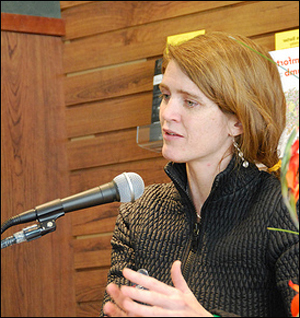Monsters and Double Standards
Monsters and Double Standards
tk
Samantha Power, the Pulitzer Prize-winning author who in recent years has played a key role in the fight to make ending genocide a major goal of American foreign policy, has been forced to resign from Barack Obama’s presidential campaign for calling Hillary Clinton a “monster.”
 Given the case that Obama has made for keeping the Democratic primary battle with Hillary Clinton on the high road, it is hard to imagine any other outcome from Power’s remark. But also at work in the Power resignation is an unmistakable double standard. Power’s attack on Senator Clinton was not a personal attack. It was an attack on the character of the “kitchen-sink” campaign that Clinton has been waging.
Given the case that Obama has made for keeping the Democratic primary battle with Hillary Clinton on the high road, it is hard to imagine any other outcome from Power’s remark. But also at work in the Power resignation is an unmistakable double standard. Power’s attack on Senator Clinton was not a personal attack. It was an attack on the character of the “kitchen-sink” campaign that Clinton has been waging.
Here is the actual quote that Power made about Senator Clinton during an interview on March 7 with The Scotsman: “She is a monster, too—that is off the record—she is stooping to anything.” Unlike the attack on Democratic vice-presidential candidate Geraldine Ferraro that Barbara Bush got away with in 1984 when she characterized Ferraro as a bitch (“I can’t say it, but it rhymes with rich,” Mrs. Bush declared), Power’s remarks have nothing to do with sexism. They speak to her anger over the kind of innuendo that Senator Clinton saw as within bounds when on the CBS show “60 Minutes,” she was asked if she believed that Obama was a Muslim. Instead of simply saying no, Clinton milked the question for all it was worth, replying, “There’s nothing to base that on—as far as I know.”
Power has publicly apologized for her “monster” remark. “I should not have made these comments, and I deeply regret them,” she said. “It is wrong for anyone to pursue this campaign in such negative and personal terms.” Power’s resignation from the Obama campaign has, in turn, been greeted with widespread approval. As Washington Post media columnist Howard Kurtz observed, with a few ill-chosen words, Power managed to “blow up her brief political consulting career.”
Left out of the equation, however, has been why Power’s remarks are beyond the pale and Hillary Clinton’s Muslim innuendo is not. In the heat of a political campaign, Power was simply saying that Clinton is ruthless. On “60 Minutes,” Clinton, by contrast, was pursuing a very different strategy. In her “as far as I know” remark, she was pandering to the idea that there might really be grounds for believing that Obama was a Muslim. To be sure, Power was direct. Clinton was indirect, but the moral gap between them suggests that Clinton was the one hitting below the belt.
It is enough to make one wonder whether the real worry for the Obama campaign was an interview that Power did with the BBC. There she spoke with a complexity that Barack Obama has not yet displayed on the campaign trail about the problems of a quick American pullout from Iraq. After explaining to her BBC interviewer that Obama’s 16-month plan for American troop withdrawal was only “a best-case scenario,” Power went on to paint a stark picture of the practical obstacles Obama would face as president. “He will of course not rely upon some plan that he crafted as a presidential candidate or as a US senator,” Power told the BBC. “He will rely on a plan, an operational plan that he pulls together in consultation with people who are on the ground, to whom he doesn’t have daily access now as a result of not being the president.”
It was the kind of thinking that would make Power an ideal assistant secretary of state, but in the midst of a heated political campaign, it is also the kind of nuanced answer that makes a candidate vulnerable. Clinton was quick to capitalize on Power’s BBC remarks. “He has attacked me continuously for having no hard exit date, and now we learn that he doesn’t have one—in fact he doesn’t have a plan at all according to his top foreign policy advisor,” Clinton observed. “I’m not sure what the American people should believe, but I would refer you to the BBC interview.”
Now Obama won’t have to explain Power’s statements as those of a trusted aide. He can ignore them or, better yet, deal with them in a way that demonstrates his thoughtfulness. It is a situation that leaves Obama with more than enough room to define his Iraq policy.
Sadly, Power’s resignation as an official advisor to the Obama campaign is a different story. It is a loss for everyone involved in the 2008 Democratic primaries. As the case of Darfur shows, genocide is alive and well in the world—but a subject of secondary interest to the nations that might actually stop it. If anyone has a commitment to reversing this trend and making genocide a mainstream issue for America, it is Samantha Power.
Nicolaus Mills, a professor of American Studies at Sarah Lawrence College, is author of Winning the Peace: The Marshall Plan and America’s Coming of Age as a Superpower (John Wiley and Sons). Photograph: Samantha Power speaking this February at a San Francisco book store. Photo by Steve Rhodes.






